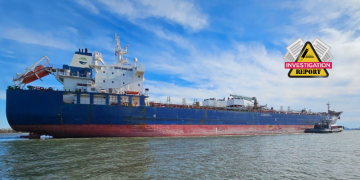The maritime industry, a vital part of global trade, is currently navigating a rapidly changing regulatory environment that will influence its present and future. Looking ahead, there are several major issues shaping the regulatory landscape for the sector.
Environmental sustainability is at the forefront, with a strong focus on reducing greenhouse gas emissions and implementing greener technologies. Safety remains a top priority, leading regulators to introduce stricter measures aimed at preventing accidents and improving emergency response systems.
Furthermore, the shifting geopolitical situation is affecting maritime security, prompting regulatory bodies to strengthen international collaboration. In this period of significant change, maritime industry stakeholders must stay informed and adapt to the evolving regulations to ensure a sustainable, secure, and technologically advanced future.
Now, let’s explore what regulatory changes to expect in the coming year.
New restrictions apply within the Red Sea and Gulf of Aden Special Areas
From 1 January 2025, new restrictions will be applied to ships regarding the discharge of oil and oily mixtures within the Red Sea and Gulf of Aden Special Areas, and regarding the discharge of garbage in the Red Sea Special Area.
On or after 1 January 2025, any discharge into the sea of oil or oily mixtures from ships of 400 gross tonnage and above shall be prohibited within the Red Sea and Gulf of Aden Special Areas, except when all of the following conditions are satisfied:
- The ship is proceeding en route;
- The oily mixture is processed through an oil filtering equipment meeting the requirements of regulation 14.7 of Annex I;
- The oil content of the effluent without dilution does not exceed 15 parts per million;
- The oily mixture does not originate from cargo pump room bilges on oil tankers; and
- The oily mixture, in case of oil tankers, is not mixed with oil cargo residues.
Furthermore, on or after 1 January 2025, any discharge into the sea of oil or oily mixtures from the cargo area of an oil tanker shall be prohibited while in the Red Sea and Gulf of Aden Special Areas. This requirement shall not apply to the discharge of clean or segregated ballast.
On or after 1 January 2025, the discharge of garbage into the sea within the Red Sea Special Area shall only be permitted while the ship is en route and as prescribed by Regulation 6 (Discharge of garbage within special areas) of MARPOL Annex V as follows:
‘’Discharge into the sea of food wastes as far as practicable from the nearest land, but not less than 12 nautical miles from the nearest land. Food wastes shall be comminuted or ground and shall be capable of passing through a screen with openings no greater than 25 mm. Food wastes shall not be contaminated by any other garbage type.’’
Application of amendments to MARPOL ANNEX VI
Amendments to Annex VI of MARPOL were adopted on 22 March 2024 by the IMO while the appendix IX of MARPOL Annex VI (information to be submitted to the IMO Ship Fuel Oil Consumption Database) was revised to enhance the granularity of annual fuel oil consumption data to be collected and reported. This will include new data on fuel oil consumption per consumer both when underway and not underway; total amount of onshore power supplied; total transport work; distances traveled; and installation of innovative technologies.
The amendments enter into force on 1 August 2025, which is part-way through the 2025 reporting calendar year. The IMO agreed that all data for the same calendar year is to be collected and reported at the same level of granularity and issued guidance on the application of the amendments to facilitate uniform data granularity over a calendar year.
Compliance with the CARB Approved Emission Control Strategy (CAECS)
Starting January 1, 2025, tankers visiting Los Angeles and Long Beach ports, as well as vehicle carriers at all California ports, must comply with the California Air Resources Board (CARB) Approved Emission Control Strategy (CAECS). This requirement is part of the At Berth Regulation (ABR), which was initially adopted in 2007 and has been enforced since 2014 to reduce exhaust emissions from ships in California ports. The most recent update, in 2020, requires ships to meet opacity standards (which measure smoke emissions from funnels) and report relevant information to local authorities within 30 days of departure. By January 1, 2027, the ABR will expand to include tankers at all California ports.
AMSA requires simplified SMS
The Australian Maritime Safety Authority (AMSA) informs that from 1 June 2025, new safety management system (SMS) requirements will come into effect, for some domestic commercial vessels, aimed at improving safety. Specifically, only owners of domestic vessels which are under 7.5 metres and of class 2 (non- passenger), class 3 (fishing) and class 4 (hire& drive) will be eligible for a simplified SMS.
The EU MRV Regulation extends
Starting from 1 January 2025, the amended EU MRV regulations will be extended to cover general cargo vessels with a gross tonnage of 400 to 5000 and offshore vessels of 400 GT and above.
Key Changes effective from 1 January 2025:
- Inclusion of general cargo vessels and offshore vessels of 400 GT and above.
- Expansion to cover CH4 and N2O emissions.
- The deadline for submitting verified EU MRV Emissions Reports will be 31 March, instead of 30 April.
- Ships must submit their emissions data for verification earlier to comply with the new system
Amendments to the IMSBC Code now mandatory
The International Maritime Organization (IMO) adopted Amendment 07-23 to the International Maritime Solid Bulk Cargoes (IMSBC) Code in June 2023. Amendment 07-23 will enter into mandatory force on 1 January 2025.
These include, but are not limited to, the following changes:
- The shippers are now required to declare the ‘bulk density’ of cargo, as required by SOLAS regulation XII/10
- Appendix 1 (individual schedule of solid bulk cargoes) has been amended (New cargo entries, cargoes have been deleted, etc.)
- Appendix 3 (list of non-cohesive cargoes) has been amended to include new cargoes
- The list of Solid Bulk Cargoes for which a Fixed Gas Fire Extinguishing System may be exempted, has also been updated
STCW Convention amendments related to electronic certificates
The amendments to STCW Regulations I/1 and I/2 allows seafarers’ certification to be in an electronic form, provided minimum information is available to the Administration, in accordance with the STCW Code. Furthermore, the amendments to part A of the STCW Code – (section A-1-2) – Electronic seafarers’ certificates, provide the minimum information to be included on seafarers’ certificates, and how, in any format.
Amendment to Appendix II of the Ballast Water Management Convention
MEPC adopted amendment to Appendix II of the BWM Convention updating the existing version of the Ballast Water Record Book (BWRB), featuring additional information on entries to be included in the BWRB and an updated BWRB page. This amendment applies on international voyages and for calling at ports other than those ports under the jurisdiction of the Administration of the ship. This excludes floating platforms, FSUs and FPSOs.
Amendments to regulations A-1 and B-2 of the BWM Convention on the use of electronic record books
These amendments allow the Ballast Water Record Book to be electronic and ensure a harmonised approach with the MARPOL Annexes and the NOx Technical Code. Operators opting to use electronic record books to comply with the BWM Convention are recommended to refer to the Guidelines for the use of electronic record books under the BWM Convention (MEPC.372(80))
Mediterranean Sea as an ECA
Since May 1, 2024, the Mediterranean Sea has been designated as an Emission Control Area (ECA) for sulfur oxides (SOx) and particulate matter (PM). However, according to amendments to MARPOL Annex VI, Regulation 14, and Appendix VII, these requirements will take effect from May 1, 2025. From that date onwards, it will be mandatory for ships to either use fuel oil with a sulfur content of 0.10% m/m or utilize an exhaust gas cleaning system (EGCS) while sailing through the Mediterranean Sea ECA.
Hong Kong Convention enters into force
This landmark Convention will enter into force on 26 June 2025. The Hong Kong convention has requirements for the design, construction, operation and preparation of ships to facilitate safe and environmentally sound recycling without compromising the safety and operational efficiency of ships; the operation of ship recycling facilities in a safe and environmentally sound manner; and the establishment of an appropriate enforcement mechanism for ship recycling, incorporating certification and reporting requirements.
To remind, the HKC was adopted on 15 May 2009 but there were three stringent conditions to be met in order for the Convention to enter into force. All three conditions were finally met with the ratification by Bangladesh and Liberia, and the Convention will now enter into force on 26 June 2025. The Convention will apply to ships of 500gt or more engaged in international trade (excluding warships and ships operating throughout their life only in waters subject to the sovereignty or jurisdiction of the state whose flag the ship is flying) and to ship recycling facilities operating under the jurisdiction of a party to the Convention.
Amendments to MARPOL Annex VI: Low-Flashpoint Fuels, Engine Replacements, and Enhanced Fuel Consumption Data Transparency
- Amendments to Regulations 2, 14 and Appendix I of MARPOL Annex VI revise the definition of gas fuels to align with the IGF Code and clarify that the in-use/onboard sampling points shall not apply to gas/low-flashpoint fuels.
- Amendments to Regulation18 apply bunker delivery note (BDN) requirements to gas/low-flashpoint fuels. Operators with ships using gas or low-flashpoint fuels are recommended to ensure that the minimum information is included in the BDN.
- Amendments to Regulation 13.2.2 of MARPOL Annex VI clarify that replacing a steam system with a diesel engine is considered a major conversion, rather than a minor modification. Where a Tier III engine would be required and a Tier II engine is permitted for installation as a replacement, the flag Administration must report this to the IMO.
- Amendments to Regulation 27 of MARPOL Annex VI allow IMO to share ship’s fuel oil consumption data with analytical consultancies and research entities, under strict confidentiality and with the company’s consent, in a non-anonymized form






























































Identified with the very useful information which regards to the new IMO regulations.